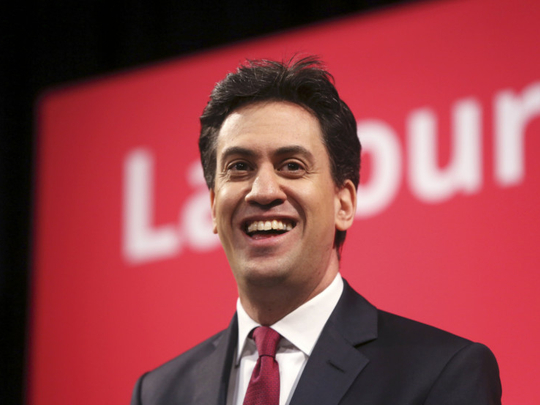
While Tony Blair was at university, he befriended an Indian postgraduate called Anmol Vellani. Britain’s future prime minister went along with the adolescent Leftism of the day — between band rehearsals — and cheerfully anticipated the market’s defeat by the state. “It is not as simple as that,” his friend had warned, as they kicked ideas around in his room. “The state, too, can be a vested interest.”
Blair the undergraduate innocent turned out to be Blair the restless reformer of government, a change he traces back to this idle student chat in his memoirs. His successor, but one at the top of the Labour party, has never undergone a similar epiphany. There is a rhythm to Ed Miliband’s leadership. He is reliably bad most of the time. Then, perhaps once a year, just as his personal ratings and public performances bottom out, he picks a well-judged fight with some passing ogre. Last week, tax evaders (and avoiders) joined Rupert Murdoch, bankers and energy companies on his list of topical enemies. Gradual decay interrupted by exhilarating showdowns: This is the Miliband cycle, like the quiet verse/loud chorus of a Nirvana single.
However, these showdowns only stabilise his position. They never generate enough escape velocity to hurtle him towards the premiership. This is partly because Britons reached a judgement about Miliband as soon as he took his post in 2010 and it will never soften. It is also because resourcefulness in the last ditch is not such an attractive trait; it can look a bit like living hand to mouth.
But the problem as Blair (and perhaps Vellani) would see it is different. Miliband’s targets, the people he calls “vested interests”, are just too obvious. Look at that enemies list again: They are all commercial forces of some kind, and pantomime villains at that. He has never defined himself against anyone you would not expect a generic Left-winger to define himself against. Like an alternative comedian venting about Margaret Thatcher at the Hackney Empire in 1987, there is nothing brave or surprising here, even if there is something of a spectacle.
Of course, there are centrist and conservative voters who are livid about tax-dodging but they will not consider a vote for Miliband until he whacks a few vested interests on his own side. That is the stuff of national leadership.
Teaching unions and other public sector lobby groups of the more-money-less-work variety are vested interests. Municipal government fat cats, such as the bureaucrats who out-earn the prime minister, are vested interests. Tax-funded charities and arts bodies are vested interests. Whitehall is a vested interest of mesmerising guile and tenacity. Even big businesses have a vested interest in the state. Regulation is rarely fatal to them — they have compliance departments brimming with staff — but it can tie down smaller rivals hoping to erode their market share.
Cynics read into Miliband’s choice of adversaries a “35 per cent strategy” to scrape electoral victory by consolidating the left. The truth is nothing so strategic: This is just who Miliband is. It is not that he is wary of confronting self-interested lobbies on the left for electoral reasons; he simply does not recognise that they exist. For all his academic enthusiasms — the sojourn at Harvard, the dry reading lists — public choice theory appears to have evaded him.
If Miliband wins in May, that Blairite epiphany will come soon enough. He will have to hold down public sector pay to balance the budget. To improve services without money — or even to stop them getting worse — he will have to ask teachers and doctors to live with structural reforms they resent. If he is serious about building more houses, he will have to prune Britain’s morass of laws on planning and land use, the one structural rigidity that Thatcher never fixed. In other words, he will have to roll back the frontiers of the state. It is hard to think of a leader of the opposition less geared to his likely work in government.
There is a lapse of the heart as well as the head here. A bad school or hospital does as much direct human harm as any of the private-sector depredations that Labour rightly crusades against. The victims are people who cannot buy their way into a luckier catchment area. And every pound wasted by government had to be earned by a worker somewhere, perhaps doing a job she does not much like. There is a space in British public life for a leader who gets as worked up about these inequities as the tax arrangements of Mayfair hedgies and Tory donors. Miliband could have filled it.
Instead, he cleaves to his tribe. They might be vested interests, he sometimes seems to be saying, but they are our vested interests.
— Financial Times










